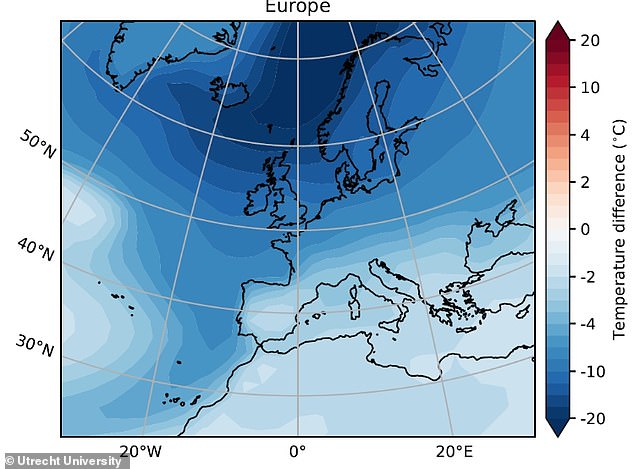
In the 2004 cinematic masterpiece ‘The Day After Tomorrow,’ the world witnessed a catastrophic international storm triggering a new Ice Age, a tale that seemed firmly rooted in science fiction. Astonishingly, the underlying science driving this chilling narrative holds a disconcerting truth.
Within the span of mere decades, experts warn that melting glaciers could potentially shut down the Gulf Stream, a complex system of ocean currents crucial for delivering warmth to the Northern Hemisphere. The repercussions of such an event are ominous, with average temperatures poised to plummet by several degrees in North America, parts of Asia, and Europe. The dire consequence? A cascade of severe effects reverberating globally.
Recent computer simulations have added weight to the concerns, revealing a looming “cliff-like” tipping point for the abrupt shutdown of Atlantic Ocean currents. Researchers from Utrecht University in the Netherlands, the architects of this unsettling study, acknowledge the uncertainty surrounding the exact timing of this collapse, although a previous investigation suggested it could happen as soon as the upcoming year.
“We are moving closer to the collapse, but we’re not sure how much closer,” remarks lead author Rene van Westen, a climate scientist and oceanographer at Utrecht University. “We are heading towards a tipping point.”
The linchpin in this climate drama is the Gulf Stream, an integral component of the Atlantic Meridional Overturning Circulation (AMOC), often described as the ocean’s conveyor belt. This intricate system transports warm surface water from the tropics to the Northern Hemisphere, releasing heat in the North Atlantic, which, in turn, freezes into ice. The resulting salt-dense water sinks and eventually resurfaces, completing a vital cycle.
Concerningly, climate change has already set the AMOC on a decelerating course. Off the coast of Greenland, the engine of this oceanic conveyor belt, an influx of freshwater from melting ice disrupts the delicate balance, contributing to the observed slowdown. Contrary to previous estimations spanning centuries, the new study suggests an abrupt AMOC shutdown might be on the horizon within the next few decades.
Utilizing advanced computer modeling simulations, researchers induced freshwater into the Atlantic Ocean, revealing a gradual weakening of the ocean circulation until it reached a critical tipping point and collapsed. The ramifications are profound – a predicted cooling of the European climate by approximately 1.8°F (1°C) per decade, with some regions experiencing an alarming 5.4°F (3°C) cooling per decade, surpassing the current pace of global warming.
Beyond the chilling prospect of a deep freeze in Europe, this cataclysmic scenario would extend Arctic ice further south, intensify heat in the Southern Hemisphere, reshape global rainfall patterns, and disrupt the Amazon rainforest. The reverberations of such a catastrophe could extend far beyond climatic shifts, potentially causing worldwide food and water shortages.
The study underscores the urgency of the situation, positing that once the tipping point is reached, the conveyor belt could shut down within a century. While the exact timing remains elusive, the research serves as a compelling early warning, prompting experts to recognize the imminent threat posed by the dwindling AMOC. Tim Lenton, chair in climate change at the University of Exeter, acknowledges the study’s robust early warning indicator but cautions against precise estimations due to insufficient data.
In the ominous quest to decipher when the world might face a climatic calamity akin to ‘The Day After Tomorrow,’ scientists are left grappling with the million-dollar question, acutely aware that the answers hinge on the rate of human-induced climate change. The study’s findings, published in the journal Science Advances, cast a stark shadow over the future, underscoring the delicate balance of our planet’s interconnected climate systems.
RELATED ARTICLES
- Geert Wilders Fails to Secure Prime Minister Position Despite Major Win
- EU conservative leaders Meet in Romania for Reelection and Victory lap
- Eritrean Gangs Wage War on the Streets of Hague, Netherlands
- Europe Bursts into Flames, Police Unable to Hold Back Anymore As Riots Intensify
- Netherlands: 5G towers torched as anti-5G sentiment grows












The end result of this article is: “Give us more money so we don’t have to do any meaningful work.”
Let’s hope that the Gulf Stream DOES disappear then we won’t have to suffer the vile hot summers with the orange ball of torture roasting us alive.